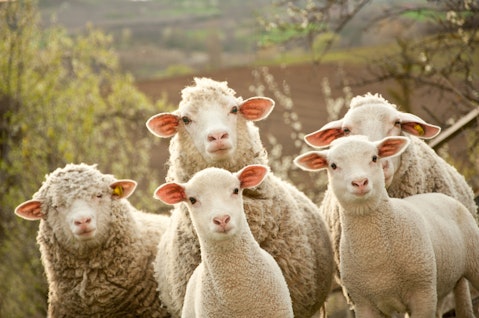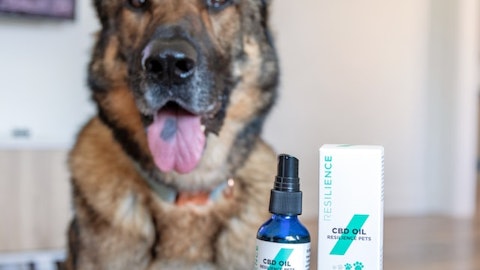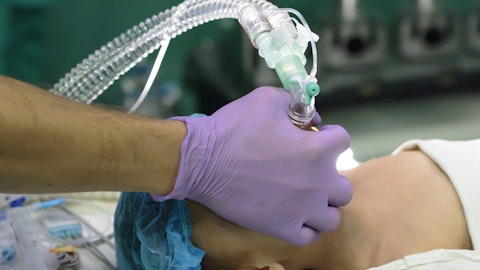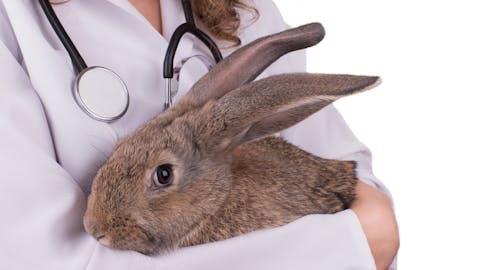Elanco Animal Health Incorporated (NYSE:ELAN) Q2 2023 Earnings Call Transcript August 7, 2023
Operator: Good morning. My name is Rob, and I will be your conference operator today. At this time, I would like to welcome everyone to the Elanco Animal Health Second Quarter 2023 Earnings Conference Call. All lines have been placed on mute to prevent any background noise. After the speakers’ remarks, there will be a question-and-answer session. [Operator Instructions] Thank you. Katy Grissom, Head of Investor Relations, you may begin your conference.
Katy Grissom: Good morning. Thank you for joining us for Elanco Animal Health’s second quarter 2023 earnings call. I’m Katy Grissom, Head of Investor Relations. Joining me on today’s call are Jeff Simmons, our President and Chief Executive Officer; Todd Young, our Chief Financial Officer; and Scott Purucker from Investor Relations. The slides referenced during this call are available on the Investor Relations section of elanco.com. Today’s discussion will include forward-looking statements. These statements are based on our current assumptions and expectations, and are subject to risks and uncertainties that could cause actual results to differ materially from our forecast. For more information, see the risk factors discussed in today’s earnings press release, as well as our latest Form 10-K and 10-Q filed with the SEC.
We do not undertake any duty to update any forward-looking statement. Our remarks today will focus on our non-GAAP financial measures. Reconciliations of these non-GAAP measures are included in the appendix of today’s slides and in the earnings press release. After our prepared remarks, we’ll be happy to take your questions. I’ll now turn the call over to Jeff.
Jeff Simmons: Thanks, Katy. Good morning, everyone. Elanco delivered a strong second quarter with meaningful progress in our late-stage pipeline, the successful completion of our ERP integration and exceeded the top end of our guidance range on revenue by $4 million, adjusted EBITDA by $61 million and adjusted EPS by $0.13. We continue to expect this sequential improvement in the first half to continue with an anticipated return to revenue growth in the second half of 2023. We are updating our expectations for the year, raising guidance for revenue, adjusted EBITDA, and adjusted EPS. Starting on Slide 4. Since our last call, we delivered improved operational performance and achieved key milestones advancing our strategy. First, in Q2, we delivered the second consecutive quarter of sequential improvement and year-over-year revenue performance, excluding the ERP blackout impact, driven by strong performance from the U.S. Pet Health business, International Farm Animal and contributions from new products.
Additionally, we completed our ERP integration and announced resolution of the EPA Seresto review, confirming the product’s continued registration. On debt, we are completing the refinancing of our August 2023 notes today. Next, in the quarter, we saw strong adoption in several EU markets for Adtab, our newly launched oral OTC flea and tick solution; and in July, we launched our Canine Parvovirus Monoclonal Antibody in the U.S. We made significant progress on our late-stage blockbuster pipeline advancing key programs and gaining additional confidence on the differentiation and launch plans. Finally, we issued our 2022 ESG report demonstrating progress on our Healthy Purpose sustainability efforts in our internal operations, customer collaborations and beyond.
Focusing now on financial performance, on Slide 5, we provide a view of year-over-year revenue for the first half of the year, excluding the impact of the ERP integration between the first two quarters. Elanco reported a 1% decline in constant currency, demonstrating a marked improvement from the 5% decline in the second half of 2022 and surpassing our guidance expectations of a 2% to 4% decline. Looking now to the key drivers in our four business areas that drove this overachievement. First, U.S. Pet Health. U.S. Pet Health returned to growth in the first half of the year, delivering 1% growth year-over-year. Our strategy to increase share of voice, improve physical availability, leverage innovation, and grow price contributed to the improved performance.
The strong parasiticides season contributed to the OTC retail market dispensing growth in both units and total sales, while Elanco execution led to share gain in this market through the first six months of the year. Both Seresto and the Advantage Family grew revenue high-single digits, exceeding expectations, as our new creative campaigns and increase in total distribution points began to payoff. On the vet clinic side, our investment in digital and enhanced sales force effectiveness drove a 36% increase in total touch points in the first half of the year. This deeper engagement with veterinarians and clinics contributed to penetration growth for Credelio and Interceptor Plus and Galliprant. While competition remains impactful in the U.S. vet market, these increased touch points and penetration contributed to the stabilization of our business in this channel.
Bobby Modi’s team’s strategic execution is improving outcomes, and we expect continued positive momentum from this business in the second half as we prepare for an exciting innovation launch window in 2024 and beyond. Next in our International Pet Health business. This business declined 7% in constant currency in the first half. 6 percentage points of the decline was driven by the impact of ongoing demand pressure in the Spain retail parasiticide market. More broadly, we saw continued growth in our Credelio franchise, balanced by slower markets, primarily impacting retail and other key geographies like Italy, China and Japan. The European launch of Adtab surpassed expectations, increasing its expected full year contribution. Our market penetration strategy and quick action has positioned us well in the emerging OTC oral parasiticide market in Europe.
We expect improvement in our International Pet Health business in the second half as we leverage innovation and anticipate a better economic environment in Europe compared to the second half of 2022. Now moving to Farm Animal. Our International Farm Animal business, the largest of the four quadrants, grew 4% in constant currency in the first half, driven by strength in poultry, aqua and price. We expect these drivers to remain strong in the second half of the year. The U.S. Farm Animal business declined 5% in the first half, with 4 percentage points driven by supply disruption for cattle vaccines and the remaining driven by implant regulation changes and timing of poultry rotations. These were partially offset by increased adoption of Experior and contribution from NutriQuest.
In the second half, we expect stronger performance from our U.S. Farm Animal business, driven by improved vaccine supply, the continued ramp of new products and increased demand for our poultry portfolio. A few comments on Experior. Experior remains an important innovation sales growth driver for this year. Beginning in March, we saw a positive trajectory change in the use of the product, which continued to accelerate through July, resulting in second quarter sales at three times those of the first quarter. Adoption in Canada is tracking on a similar trajectory as the U.S. We continue to focus on expanding use with existing customers and expect to exit the year at an annualized run rate of approximately 60 million to 70 million. Finally, we’re encouraged by the recent announcement from Tyson Foods to reintroduce animal-only antibiotics or ionophore into their poultry supply chain.
Elanco leads the in-feed poultry solutions area with a variety of tools from nutritionals to our differentiated narasin, an ionophore, products, Maxiban and Monteban, which we expect will be key products in these new programs. As the processor of about one-fifth of all the U.S. chickens, we believe Tyson shift will result in a more sustainable production, improved animal welfare and a positive net impact on Elanco’s business. Moving now to Slide 6. Let’s look at the strategic drivers of our innovation, portfolio and productivity framework over the past few months. First, with productivity. In April, we successfully completed our ERP integration, simplifying our internal and customer-facing business processes and enabling synergies. Among other things, the simplification offered the ability to engage in a commonly used accounts receivable asset securitization program.
This program will provide the majority of the funds to retire our 2023 notes, which we are completing today. Next, onto the portfolio. For Seresto, we’re very pleased with the outcome of the EPA’s comprehensive review and the confirmed continued registration of the product. We never wavered in our data-driven confidence in the safety profile of Seresto, and we are encouraged by the robust science-based approach taken by the agency. We view the stewardship plan as an opportunity to raise the bar across the collar category. We see the EPA outcome as a positive for the Seresto brand, pet retail, veterinarians and, most importantly, pet owners. We now shift our focus to maximizing the commercial opportunity for Seresto globally, with a product returning to high single-digit growth in the U.S. in the first half of this year.
Next, price continues to be strong, driven by the improved capabilities over the last year with 4% growth on a year-to-date basis. We now expect price growth of at least 3% for the full year. With the encouraging pipeline progression and our expectations regarding differentiation, we’re increasing our investment in the U.S. Pet Health business. The commercial organization, led by Bobby Modi, in partnership with Tim Beddington, leading our market strategy efforts, are focused on building on our digital progress, adding experienced animal health marketing talent and accelerating our efforts to expand our field force. This investment is focused on maximizing the potential of our total pet health portfolio, including our launches this year and the innovation we expect to launch in 2024 as we globalize the portfolio over time.
Finally, moving to Slide 7, I’ll provide an update on our late-stage pipeline. Overall, the pipeline is strengthening with important progress in key late-stage programs and portfolio-enhancing approvals in major markets across species. Ellen de Brabander and her team are driving early-stage advancements, moving exciting projects from research into clinical development as we continue to build the components needed to deliver consistent, high-impact innovation. In the U.S., we launched our canine parvovirus monoclonal antibody, a highly anticipated treatment for one of the most contagious and deadly dog viruses. The supply chain is enabling responsiveness and the product is already saving dogs’ lives, driving reorders. As expected, in 2023, demand is outpacing supply due to the anticipated capacity limitations in our facility at launch.
We are on track to ramp up our capacity to 10x today’s volume to support the expected increase in demand in the coming years. This year, we expect revenue contribution of $5 million to $7 million. However, we see this product as an important growth driver to both the top- and bottom-line starting in 2024 and expect blockbuster contribution as we expand outside the U.S. over time. As we’ve shared previously, we took a phased approach to filing our late-stage potential blockbusters. With three products in late-stage review, we appreciate the predictable nature of the FDA process, driven by ADUFA, the Animal Drug User Fee Act. Our views about our products are based on the data we’ve generated and, of course, are subject to the approval process.
Today, we are proud to share that we believe the FDA has all the data necessary to approve our differentiated JAK inhibitor for canine dermatology. We are encouraged by this product’s progress and believe it will be highly valued by veterinarians and pet owners. Additionally, by the end of August, we expect the FDA will have all the data necessary to approve our broad spectrum parasiticide for dogs, and for Bovaer, our methane-reducing product for cattle. Based on this, we continue to see a path towards FDA approval in the first half of 2024 for all three of these potential blockbuster products. With the developments in the parasiticide space, over the last month, our confidence regarding the expected differentiation for our canine broad spectrum parasiticide has increased.
Our product, upon approval, will be known as Credelio Quattro. A combination of lotilaner and three other active ingredients, it will focus on fleas and ticks as well as broad coverage of internal parasites, including heartworm, round warm and tapeworm. The product is seeking to demonstrate 100% heartworm prevention after one month. We expect that differentiated coverage of Credelio Quattro and the differentiation of our JAK inhibitor for dermatology, this will allow Elanco to provide a more comprehensive and valuable portfolio of canine products to veterinary clinics in 2024. Shifting to Bovaer, our first-in-class innovation to enable methane reduction in cattle where we will focus our initial efforts first on dairy. Based on the wide body of research supporting the product’s approval in many countries around the world and our discussions with the FDA, we’re highly confident in the path to approval for this product in the first half of 2024.
Importantly, we believe we have secured necessary launch supply with a contract manufacturer, a key component of the 2024 growth contribution. As we pioneer new ground with products to reduce environmental impact, we are working across the value chain to validate, aggregate and create value for reducing livestocks’ environmental impact and we are encouraged by the interest from the food chain. Regarding our IL-31 short-acting monoclonal antibody for canine dermatology, we now expect a differentiated product profile relative to the current technology. However, our expectation for U.S. approval has shifted to 2025 as a result of the USDA’s increased data requirements across monoclonal antibody platforms. We remain confident in the product and its value in our overall portfolio.
Our innovation sales for 2023 continue to track to our guidance of $210 million to $250 million, and we still expect to have incremental innovation revenue of $600 million to $700 million by 2025. The shift of IL-31 is balanced by increased expectations for our other late-stage potential blockbuster products as well as confidence in our views on Experior, Parvo and Adtap. Over the last several months, our launch revenue expectations for our late-stage potential blockbusters have increased as a result of higher confidence in our differentiation, enhanced launch plans and the evolving competitive landscape. We understand delivering on our opportunities and our pipeline go well beyond getting the product over the regulatory finish line, and we are investing in talent and capabilities to fully capture the value of our portfolio in 2023 and beyond.
Now I’ll pass it to Todd to provide more on the second quarter results and financial guidance.
Todd Young: Thank you, Jeff, and good morning, everyone. Today, I’ll focus my comments on our second quarter adjusted measures, so please refer to today’s earnings press release for a detailed description of the year-over-year changes in our reported results. Starting on Slide 9. In the second quarter, we delivered $1.057 billion of revenue, a decline of 10% or 9% in constant currency. Price contributed 4% in the quarter. In April, we completed our global systems integration, bringing the legacy Bayer Animal Health business into the Elanco ERP environment. We remain confident in our May estimate, which includes a revenue shift between quarters from the ERP blackout estimated in the range of $90 million to $110 million, representing an 8 percentage point to 9 percentage point detriment to growth in the second quarter.
Outside of this, the base business performed above our expectations in the second quarter with an estimated flat to 1% revenue decline in constant currency compared to prior year, as shown on Slide 10. This represents a trajectory change from mid-single-digit constant currency decline we reported in the last few quarters. Consistent with last quarter, on Slide 11, we provide our revenue results by business area on a reported and constant currency basis. For Pet Health, constant currency decline was 14%, with an estimated headwind of 11 percentage points to 13 percentage points from the ERP blackout. In the U.S., Pet Health revenue declined 9%, including an estimated 11 percentage point headwind from the ERP blackout. The estimated 2% growth in the underlying business was driven by OTC retail, as our strategic efforts drove improved dispensing while also benefiting from price, innovation and supply disruption in the second quarter of 2022.
This year, we increased our participation in retailer promotion events with key e-commerce partners, resulting in increased purchasing in the second quarter. Relative to our guidance in May, we estimate approximately $10 million of OTC products were sold to retailers in the second quarter versus our expectation for the third quarter. Additionally, we saw growth in our pain portfolio in vaccines despite supply disruptions on certain vaccines. Growth was partially offset by continued pressure on our legacy prescription parasiticide portfolio; however, share loss has slowed over the last several quarters. International Pet Health declined 23% in constant currency, with an estimated headwind of 14 percentage points from the ERP blackout. Excluding the blackout impact, the underlying business decline was driven primarily by our Spain retail business.
Exceptionally strong demand expectations and purchasing from distributors and retailers in the first half of 2022 was followed by [pressured] (ph) economic conditions. As a result, demand did not materialize in the second half of 2022 and remain below expectations in the first half of 2023, resulting in a year-over-year decline in both periods for our business. In 2023, this impacted our business in the first quarter, but was more significant in the second quarter. We believe continued improvement in consumer demand will drive sales improvements in the second half of 2023 and the first half of 2024. Moving to Farm Animal. Our global business declined 3% with an estimated 5% headwind from the ERP blackout. Excluding that, the underlying business growth was driven by strength across international poultry and aqua, partially offset by expected declines in U.S. cattle related to vaccine supply disruption and regulatory changes for implant.
Supply disruption for cattle vaccines is expected to be remediated in the third quarter, providing a tailwind in the second half, but to a lesser extent than we expected in our call in May. Continuing down the income statement on Slide 12. Gross margin increased 10 basis points to 58.9%. Gross margin included 150 basis points to 180 basis points of unfavorability from the ERP blackout. The underlying improvement was driven by price growth, productivity and the favorable impact of FX on cost of sales, offset by higher inflation. Operating expense increased 2% year-over-year in the quarter, with R&D expenses down 1% to $81 million and SG&A expenses up 3%, driven by increased marketing investment and employee-related expenses, partially offset by the favorable impact of foreign exchange rates.
Interest expense was $74 million compared to $50 million last year, slightly better than our expectations. Adjusted EBITDA was $222 million in the quarter or a decline of 27% with an estimated $70 million to $90 million headwind from the ERP blackout. Adjusted EBITDA margin was 21%, a decline of 490 basis points with an estimated 450 basis point to 540 basis point reduction from the blackout. Adjusted EPS was $0.18 in the quarter, with an estimated $0.11 to $0.14 headwind from the ERP blackout, assuming a corporate consolidated tax rate in line with the first quarter of 21.9%. On Slide 13, we provide a walk from our second quarter guidance to actuals. The over performance compared to guidance for adjusted EBITDA and adjusted EPS in the quarter was driven by higher-than-expected sales and our higher margin U.S. Pet Health business.
Additionally, the adjusted EBITDA benefit of $61 million compared to the top end of the guidance range, included favorable impacts on COGS and lower operating expense. The adjusted EPS benefit of $0.13 was also impacted by $0.03 of favorability from interest and tax. Before moving to guidance, let me offer a few words on our cash, working capital and debt on Slide 14. Cash provided by operations was $61 million in the quarter. The year-over-year decline in the second quarter operating cash flow reflects the impact of last year’s interest rate swap settlement, higher cash interest and an increase in net working capital, specifically from inventory. Inventory was the use of cash again this quarter, driven primarily by increased Farm Animal inventory, largely as a result of pressure on sales volumes over the last several quarters.
We are very focused on actions to improve working capital. The system integration enables opportunities to streamline collections across our entire business, improving accounts receivable, and we are improving inventory management by reducing distribution centers. We are taking further actions to manage our inventory, including renegotiating the timing of delivery on API and raw material contracts, assessing safety stock levels by product and ongoing reduction of throughput at certain manufacturing facilities. These efforts are expected to deliver benefits to the balance sheet gradually over time as we implement changes while also prioritizing new product launch supply needs. We ended the quarter with net debt of $5.75 billion, with $250 million drawn on our $750 million revolver.
Today, we will retire the $344 million of notes due in 2023 as we reported on our Form 8-K from early July. We will fund the retirement with a $250 million asset securitization facility on accounts receivable and approximately $100 million from the revolving credit facility. As Jeff mentioned, the consolidation of our ERP system provided us the flexibility to enter into the securitization agreement. At the end of June, our net leverage ratio was 5.9x, up from 5.4x at the end of the first quarter, but below our expectations due to our adjusted EBITDA outperformance in the second quarter. Given the increased use of cash for inventory above our expectations in the second quarter, we now expect to pay down $50 million of debt in 2023. We anticipate our year-end net leverage ratio will be between 5.5x and 5.8x.
Importantly, we continue to expect durable cash flows from our business over time with debt paydown as the primary capital allocation priority. The next significant debt obligation is due in 2027. We have updated Slide 23 to reflect our key debt information after the retirement of the 2023 notes. In May, we fixed an additional $750 million of variable rate debt with interest rate swaps that mature in 2028. As a result of these two financing transactions, our fixed rate debt will remain approximately 75% of total debt through the end of this year. After including the late July rate hike by the Federal Reserve, if we assume flat interest rates throughout 2024, no more Fed rate adjustments, we expect next year to have income statement interest expense of approximately $305 million to $315 million and cash interest between $340 million and $355 million or a $40 million to $55 million improvement compared to this year on cash interest.
Finally, we have also included Slide 24 in the appendix which points to our expected meaningful reduction in project cash costs beginning in 2024. Now let’s move to our financial guidance, starting on Slide 16. As Jeff said, we are raising our full year guidance for revenue, adjusted EBITDA and adjusted EPS. For the full year, we now expect revenue to be between $4.35 billion and $4.41 billion or approximately 1% growth to a 1% decline in constant currency. For adjusted EBITDA, we now expect $950 million to $1.01 billion. Adjusted EBITDA reflects the improved sales outlook and the second quarter overperformance. It also factors in gross margin headwinds we expect from reducing manufacturing throughput to reduce inventory and improve cash and the investment in our pet health business that Jeff described.
For adjusted EPS, we are raising our guidance to $0.80 to $0.89, reflecting the adjusted EBITDA impacts and improved assumptions for interest expense and tax. On Slide 17, we are introducing financial guidance for the third quarter. We expect revenue of $1.025 billion to $1.06 billion, representing a constant currency growth range of 1% decline to 2% growth. We expect adjusted EBITDA between $170 million and $200 million, and adjusted EPS of $0.08 to $0.13. Finally, moving to Slide 18. Our implied second half revenue guidance represents flat to 3% constant currency growth. We remain confident in the second half return to growth, led by contributions from price, new product ramps, improved supply for vaccines and continued growth in poultry and aqua, offsetting continued pockets of competition.
Now I’ll hand it back to Jeff for closing comments.
Jeff Simmons: Thanks, Todd. As we close, I want to thank the global Elanco team. This team around the world is laser-focused on delivering value for our customers and shareholders, and our results this quarter reflect significant progress. We delivered a strong second quarter, demonstrating operational improvement, exceeding our expectations and contributing to our raised full year guidance. The continued sequential improvement in year-over-year underlying revenue performance was driven by a return to growth in the U.S. Pet Health business, strong International Farm Animal performance and contribution from the new products. We expect this momentum to continue with an anticipated return to revenue growth for the company in the second half of 2023.
Importantly, we’ve reached the pivot point with our standup and integration now behind us and an optimized infrastructure to build our next era of innovation and growth. Our team is making strong progress on our efforts to transform animal care, bringing new solutions to some of our customers’ greatest challenges from diabetes and cats to deadly parvovirus and puppies to environmental solutions in cattle. This quarter, we made significant pipeline progress on our late-stage pipeline, enhancing our confidence in our differentiation and launch revenue expectations. We are very encouraged by this advancement and are investing to maximize the potential of our full portfolio and the expected launches. Our focus is on consistent delivery and sustained innovation with a balanced outlook for future growth, improved cash flow and long-term value generation.
With that, I’ll turn it over to Katy to moderate the Q&A.
Katy Grissom: Thanks, Jeff. We’d like to take questions from as many callers as possible. So we ask that you limit yourself to one question and one follow-up. Operator, please provide the instructions for the Q&A session, and then we’ll take the first caller.
See also 12 Best Electrical Equipment Stocks to Buy Now and 15 Best Places to Retire in Florida Without Hurricanes.
Q&A Session
Follow Elanco Animal Health Inc (NYSE:ELAN)
Follow Elanco Animal Health Inc (NYSE:ELAN)
Receive real-time insider trading and news alerts
Operator: [Operator Instructions] Your first question comes from the line of Mike Ryskin from Bank of America. Your line is open.
Mike Ryskin: Great. Thanks for taking the question, guys. My first one is going to focus on the innovation side of things. There were a number of times you flagged that you have all necessary data for approval with the FDA. So that’s the case for the JAK inhibitor now, and then you expect that to be the case for Credelio Quattro and Bovaer by the end of August. Could you just walk us through what comes after that? What are the additional steps? Obviously, that’s in the hands of the FDA at that point, but it is a four- to four-month window from all data with the FDA to approval, assuming things go correctly, and there’s no secondary data request. Does four or six months the right way to think about that timeframe?
Jeff Simmons: Yes, Mike, thank you. Thanks for the question. That is correct. So what we were doing here is to just be very clear is whether it’s dialogue with the FDA or the submission itself, we’re confident that they have the information they need. As you know, when the ADUFA process, these products are subject to approval, but that is correct. And I think we disclosed some additional information today that really reiterates and builds our confidence more than even a quarter ago, relative to that $600 million to $700 million commitment that we have. And I just really want to emphasize that, the $210 million to $250 million of innovation led by Adtab, the Experior success, the parvo success, that will be our base, and then the additional information that we shared on Credelio Quattro, our broad spectrum parasiticide, the Bovaer as well as — those two submissions as well as the JAK1 inhibitor.
So that is correct. When you follow the ADUFA process, which is predictable, you are going to see that, that’s in that window of four to six months, which put us on the path for the first half of 2024.
Mike Ryskin: Great. Thanks. And kind of related to that, one for Todd. As you called out, you beat the 2Q EBITDA by a little over $60 million, but you’re raising the full year by only about $10 million. So, you talked about the moving pieces in the second half, a little bit on gross margin, but you also flagged additional investments in Pet Health. Could you talk through what that — what those investments are? And is that the biggest part of the incremental spend in the second half? Just clarify that second half EBITDA bridge for us a little bit. Thanks.
Todd Young: Sure, Mike. Thank you for the question. Yes, we’re very pleased with how the team executed across the second quarter. We always take a balanced approach in looking at our business and have a lot of things breaking our way this past quarter to deliver that significant EBITDA beat. As we then look to the second half, we’re focused on continuing to build and create value for the long term. As Jeff just mentioned, the innovation that’s coming is critical to that long-term success and continued increased EBITDA growth we expect to have. To that end, we’re investing about $10 million incrementally on sales force expansion for our U.S. Pet Health team to drive both the complete portfolio, but also the new innovation. Embedded in that is also increasing global marketing expertise with Tim Beddington and his team that we’re building underneath Tim to be ready to globalize these products to build them out in international markets over time as well.






